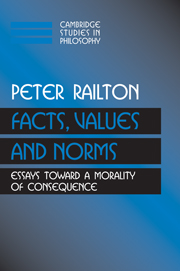Book contents
- Frontmatter
- Contents
- Foreword
- Part I Realism about Value and Morality
- Part II Normative Moral Theory
- Part III The Authority of Ethics and Value – The Problem of Normativity
- 10 On the Hypothetical and Non-Hypothetical in Reasoning about Belief and Action (1997)
- 11 Normative Force and Normative Freedom: Hume and Kant, but Not Hume Versus Kant (1999)
- 12 Morality, Ideology, and Reflection; or, the Duck Sits Yet (2000)
- Index
11 - Normative Force and Normative Freedom: Hume and Kant, but Not Hume Versus Kant (1999)
Published online by Cambridge University Press: 18 December 2009
- Frontmatter
- Contents
- Foreword
- Part I Realism about Value and Morality
- Part II Normative Moral Theory
- Part III The Authority of Ethics and Value – The Problem of Normativity
- 10 On the Hypothetical and Non-Hypothetical in Reasoning about Belief and Action (1997)
- 11 Normative Force and Normative Freedom: Hume and Kant, but Not Hume Versus Kant (1999)
- 12 Morality, Ideology, and Reflection; or, the Duck Sits Yet (2000)
- Index
Summary
Our notion of normativity appears to combine, in a way difficult to understand but seemingly familiar from experience, elements of force and freedom. On the one hand, a normative claim is thought to have a kind of compelling authority; on the other hand, if our respecting it is to be an appropriate species of respect, it must not be coerced, automatic, or trivially guaranteed by definition. Both Hume and Kant, I argue, looked to aesthetic experience as a convincing example exhibiting this marriage of force and freedom, as well as showing how our judgment can come to be properly attuned to the features that constitute value. This image of attunement carries over into their respective accounts of moral judgment. The seemingly radical difference between their moral theories may be traceable not to a different conception of normativity, but to a difference in their empirical psychological theories – a difference we can readily spot in their accounts of aesthetics.
INTRODUCTION
‘Normativity’ is, for better or worse, the chief term we philosophers seem to have settled upon for discussing some central but deeply puzzling phenomena of human life. We use it to mark a distinction, not between the good and the bad (or between the right and the wrong, the correct and the incorrect), but rather between the good or bad (or between right or wrong, …), on the one hand, and the actual, possible, or usual, on the other. Ethics, aesthetics, epistemology, rationality, semantics – all these areas of philosophical inquiry draw us into a discussion of normativity.
- Type
- Chapter
- Information
- Facts, Values, and NormsEssays toward a Morality of Consequence, pp. 322 - 352Publisher: Cambridge University PressPrint publication year: 2003



